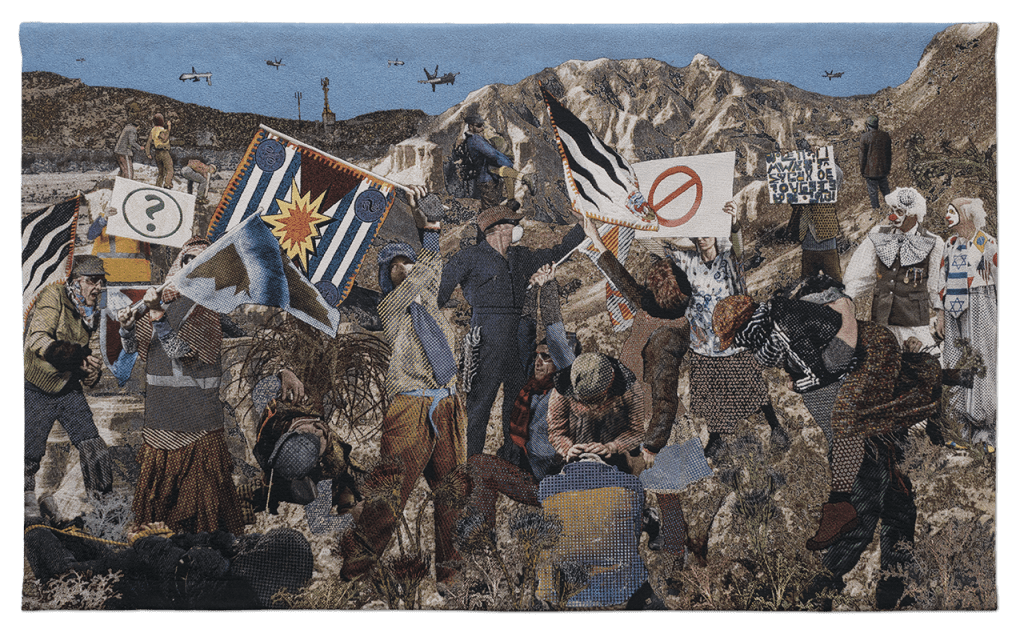Transcribed from the 17 February 2018 episode of This is Hell! Radio (Chicago) and printed with permission. Edited for space and readability. Listen to the whole interview:
The deepest aim of liberalism is to liberate humans from each other—from any relationship that’s not chosen, to which we don’t consent—and also, by extension, to liberate us from nature. In pursuing these two forms of liberty, we create the conditions for a new aristocracy.
Chuck Mertz: Liberalism has failed. It cannot be salvaged. It’s done. Ironically, what killed liberalism is its own success. That’s what happens when you have a liberation theory based first and foremost on individual rights. Here to help us understand how and why liberalism failed, political scientist Patrick J. Deneen is author of Why Liberalism Failed. Patrick is David A. Potenziani Memorial Associate Professor of Political Science at the University of Notre Dame; his most recent book prior to Why Liberalism Failed is 2016’s Conserving America?: Essays on Present Discontents.
Welcome to This is Hell!, Patrick.
Patrick J. Deneen: Thank you for having me.
CM: You have a quote from the late, great historian Barbara Tuchman writing in the classic A Distant Mirror on the calamitous fourteenth century: “When the gap between ideal and real becomes too wide, the system breaks down.”
How much do you think liberalism failed, in your opinion, because of a gap between what it was ideally meant to be and what it really became?
PD: When I came across this quote as I was finishing the book, I thought it was the perfect summation of my argument. Tuchman is describing the loss of legitimacy particularly of the old aristocracy in the Middle Ages. There was a gap between claims about chivalry and protection of the weak and the actual reality of lived experience in the feudal order. This situation is remarkably similar to the one we find ourselves in today; there’s a similar gap between the claim of ever greater and more expansive equality on the one hand and the felt experience of many people in the most advanced liberal countries of the West, who are not partaking and enjoying the fruits of their societies.
CM: I know this is kind of odd, but let’s talk about the gap in chivalry. When we think of chivalry nowadays, we still have a positive view of it. How much do we rewrite history and forget about the gaps in political philosophies and ideologies?
PD: You might be right that we have a hazy or romantic view of chivalry. But at the same time we are also suspicious of its claims; it can be used as a shroud of the powerful to defend their enforcement of inequality over the weak. Today it’s suspicious if a man were to stand up sitting on a bus to give way to a woman. It’s seen as an act of superiority in some ways, and frowned upon. That reflects what had become the view of many that chivalry was actually just a mask for power, really just a way to shroud existing power relationships.
When Tuchman is saying with that observation is that the legitimacy of the order of hereditary aristocracy ceased to be believed, especially by the people who were not part of that aristocracy. By extension we could say that there is a growing belief now among many who don’t enjoy the fruits of our society that the claims of commitment to equality coming from upper class elites today are not to be believed.
CM: How does liberalism shroud those power relations in a way that might be similar to the way that chivalry did?
PD: We’d have to begin with what I mean by liberalism, and it’s not the narrow partisan term where liberal is used to define the political left. I really mean our comprehensive political order, in which both the left and the right partake. This is an old political philosophy, its roots go back centuries. Think of the philosophies of John Locke or even of our founding fathers: liberalism was a philosophy that argued for the overturning of the old aristocratic order and its replacement with a new, open society so that your position in society wasn’t defined by the position of your birth or the rank of your parents.
On the one hand, liberalism is an effort to crack open what had been fixed, ascribed positions within society. On the other hand, we could say the deepest aim of liberalism is to liberate humans from each other—from any relationship that’s not chosen, to which we don’t consent—and also, by extension, to liberate us from nature. In pursuing these two forms of liberty (liberty from other people and liberty from nature), we create the conditions, interestingly and ironically, for a new aristocracy: the aristocracy that we see increasingly today, what we call a “meritocracy.” Often those people who are educated at the top universities occupy positions of power in our society.
In a way it’s comparable to the loss of legitimacy in the Middle Ages, to the extent that there is a new aristocracy that people think is just as fixed, and just as difficult to change.
CM: You say that this new aristocracy is even more pernicious than the one that it was trying to replace with liberalism. Why?
PD: Those who occupy the position of the new aristocracy—we can call them the new meritocrats—don’t really believe that they are aristocrats. They don’t believe they are in a position of superiority or advantage, because of the way liberalism operates on the belief that we are self-making. There’s a logical leap, also, that we all begin equal—we all begin from a position of equality—so any differentiation is simply the result of your own work and your own effort.
We know, of course, that there are extraordinary advantages that come from one’s family, from one’s birthright, in interesting and comparable ways to the old aristocracy. But the belief in this openness and the capacity for people to change their position—which some people do, but most people don’t—leads to a base belief in a deeper equality that tends to shroud from those in the superior position their own advantages.
CM: What explains to you why the earliest liberal philosophers did not foresee what liberalism would become, did not foresee the unsustainable progress made by only focusing on individual rights as a way to liberate everybody?
PD: Let me take the case of the people who wrote the US constitution. On the one hand, philosophically, Alexander Hamilton, for example, wanted a society in which people could liberate themselves from whatever background they came from. He himself came from fairly disadvantaged circumstances and made something of himself. We think of this as the American dream. But in order to do this, we have to reconfigure society so that people can be more self-making than ever before in history. This means liberating them from particular bonds to people, particular bonds to places, to history and tradition (cultural inheritances have to be minimized). Everything becomes more fluid. Everything that we think about as forming the human identity becomes subject to our choice, and so we become much more self-making. This is the condition of our liberty.
Liberalism has been more insidious than more obviously violent and horrific regimes: by promoting the vision of the liberated self, civil society isn’t threatened with the point of a gun, but it’s indirectly threatened simply by loss of interest and commitment.
This could be stated as a philosophical ambition without seeing the real dangers of it becoming universalized, because the founding fathers were writing at a time in which society was made up of very thick bonds and very thick relationships, very deep relationships to family and place and tradition, culture, and religion. The argument in my book is that we see liberalism failing because it has been so successful in achieving these very aims and ends, but at the cost of those thick bonds and relationships that were always a moderating influence on this radical individuation that we see increasingly as a mark of our society.
CM: You write, “Only a politics grounded in the experience of a polis, lives shared with a sense of common purpose, with obligations and gratitude arising from sorrows, hopes, and joys lived in generational time and with the cultivation of capacities of trust and faith, can begin to take the place of our era’s distrust, estrangement, hostility, and hatred.”
How much is that counter to the rugged individuality that we not only embrace today but that has been embraced since Alexis de Tocqueville?
PD: I take issue with the view that we enjoy rugged individuality. The rise of what we think of as individualism—the capacity to live this life shorn of these thicker bonds that were once much more constitutive of our selves—is increasingly a consequence of a massive structure created both through the state as well as by efforts to forge an economic order. This idealized vision of the liberal human being choosing oneself, making oneself, requires a massive apparatus of state, market, science, and technology as well as the transformation of the social, private, political, and economic order of the world to make possible the creation of this radically individual self.
We tend to think that there is a divide between the individual and collectivism or statism, but what is in fact the case is that this vision of the individual can only come into being with a massive construction of legal, political, economic, and technological orders that make such an individual possible.
When I pose, then, as a counter to this, the creation or cultivation of certain kinds of relationships and practices, the cultivation of a new kind of culture, it’s really to argue that if we don’t want to fall into the twin dangers of both statism and individualism, we have to create something in the middle. That something, in Alexis de Tocqueville’s time, was associations, or civil society. Even that’s been increasingly hollowed out, so it has to start fairly close to home, in the cultivation of practices in the home, in the neighborhood, for those who are religious in their churches and synagogues and so forth, and build out from there.
CM: Is liberalism, then, a threat to civil society? A lot of people might think that civil society is part of liberalism.
PD: In the classical theory of liberalism, there was the view that liberalism in particular could provide a protective space for the flourishing of civil society. The state would be limited; it wouldn’t seek to fill all the areas of life, as we see in totalitarian regimes, in which fascism or communism attempt to eliminate civil society at the point of a gun. In this way, liberalism has been more insidious than those more obviously violent and horrific regimes: by promoting the vision of the liberated self, civil society isn’t threatened with the point of a gun, but it’s indirectly threatened simply by loss of interest and commitment from these individuated selves.
We can look at a lot of social science—for example going back to the classic study by Robert Putnam, Bowling Alone, or more recent studies of religion like one by my colleague here at Notre Dame, Christian Smith, we see across a broad swathe of classic civil society the radical declines and even collapses in participation, membership, and strong identification of people with associations, voluntary groups, religious groups, and so forth.
What’s striking is that without enforcing a certain view about civil society as it exists in other regimes, there’s a weakening of civil society simply by the expansion of and the deepening sense of individualism that has now proven to be a deep threat to the existence of civil society.
CM: I don’t want to put words in your mouth, but I love this idea of—if you will—a collectivized individual. You write, “Sacrifice and patience are not the hallmarks of the age of statist individualism, but they will be needed in abundance for us to usher in a better, doubtless very different, time after liberalism.”
How much has liberalism become statist individualism? Was it always statist individualism? And how much are we really individuals?
PD: There’s an example I offer in the book that I think is illustrative. As a part of president Obama’s reelection campaign, there was an ad that ran on the internet called “The Life of Julia.” It portrayed, in a series of slides, the life of a woman, basically from birth until shortly before death, who was able to lead the life that she wanted through a series of government programs. Of course, this was an effort to say that the government was providing a whole series of benefits and supports for people like Julia to lead the kind of life that they might hope to live.
What is striking about that political commercial, though, is that there was no other human being portrayed in it. In other words, her individualism was a result of a series of government programs. You had to think for a moment about the paradox of this: seeing collectivism, the government, the statist apparition, as the source of our deepest and most pervasive liberties. This is the deepest irony of this vision of the individual self, that it’s only through an expansive state that one can experience this form of the individual that’s portrayed in the state of nature, this radically autonomous individual self.
Social science suggests we’ve become more and more individualistic over time. I don’t think we’ve always been this way. But there’s a thumb on the scale, a deep undercurrent in the liberal regime, that moves us in this direction, that places this vision of the individuated self as the ideal to which we should aim and which government, economics, science, technology, and education should ultimately support. It seems to me that to the extent we see this crisis within the liberal order, there is a need to press against the deeper inclinations of the regime itself.
On a very deep and often undetected level, the liberal order in its deepest presupposition does shape the world according to its idea of human nature—that is to say, the liberated, free, autonomous self—and it creates the world in that image.
CM: You write how liberalism today contradicts itself. How much does liberalism inherently contradict itself?
PD: There is a logic to its base claims. In one sense, it simply achieved what it set out to do: to liberate people from any unchosen form of life. That’s at the heart of liberalism: the vision of a human being who isn’t told what to be or who to be, what kind of job to have, what kind of identity. This is the ideal: a human who can choose who they are. But in order to make this real, we enter a condition in which, ironically enough, we cease to experience this freedom.
To create the kind of state that’s needed to support the creation of this individual; to have the kind of economy we need, an increasingly a globalized market that supports the creation of this radically individuated self; to have the scientific and technological apparatus that allows us to roll back the limits that nature imposes upon us—let’s take those three examples. State, market, and technology. When people today talk about three areas of life where they feel relatively little control over their fate, those are the areas where that loss comes to the fore. We feel like we don’t control our government, we feel like we don’t control our economy, and we feel like we don’t control the trajectory of science and technology (in developing automation that will put us out of work, and so forth).
The tools of our liberation become our captors, if I could put it that way.
CM: You write, “Liberalism is the first of the modern world’s three great competitor political ideologies, and with the demise of fascism and communism it is the only ideology still with a claim to viability. There are those who fear that when liberalism fails, it will mean the revival of one of the other ideologies of the modern world. The left fears a rise of fascism, and the right is frightened by the prospects of communism.”
How much are liberalism’s competitors in political ideology, fascism and communism, actually dead? Or have their deaths been greatly exaggerated?
PD: I’ve been fascinated by the responses to my book, some very hard-hitting criticisms from both the left and the right: the left sees in my pages the threat of fascism, and the right sees in my pages the threat of communism. You’re quite right about that. There’s the felt sense, both on the left and on the right, that if we don’t defend liberalism, one of these two competitor ideologies is all that’s available to us.
I would hope that it is possible for us to begin to think about organizing political society on a non-ideological basis. What I mean by that is to eschew some unitary conception of what human society should look like and the impulse to pursue that unitary conception. That’s what I understand by ideology: it’s an idea that we have about politics to which the life-world ultimately has to conform. That was certainly true under communism and certainly true under fascism.
In the West we’ve tended to believe that liberalism is the one system that doesn’t demand that we conform to a certain vision of human life, and that allows us a wide area for differentiation, to lead lives of very different types: pursue your own religion, pursue your own beliefs, have your hobby, what you will. But on a very deep and often undetected level, the liberal order in its deepest presupposition does shape the world according to its idea of human nature—that is to say, the liberated, free, autonomous self—and it creates the world in that image.
So in the name of freedom, I would say: ought we not at least entertain the possibility of something beyond these three ideologies and to begin the hard but necessary work of thinking anew about the nature of politics? It’s in part to push back against what are inherent and troubling tendencies within the liberal order itself.
CM: You were talking about how the state continues to expand, ironically, even though we believe that we have this idea of rugged individualism. But over the last forty years we’ve had president after president, whether Republican or Democrat, all propose some limiting of government if not making it “small enough to drown in a bathtub.” We’ve also seen the privatization of what had been publicly held goods in the past.
So how is the expansion of government that you mention taking place, while simultaneously government has been supposedly shrinking?
PD: Government tends to expand in areas that conform to the vision of the liberated human individual, whereas government tends to withdraw in areas where that idea self is not the primary aim. One could think, for example, of the deregulation of much of the economy under Ronald Reagan (and continuing), and the expansion of markets through NAFTA and other global trade agreements. On the one hand, this is a withdrawal of the government, but it’s also the government being active in the construction of certain kinds of market systems. This has been the agenda especially of the political right.
The agenda of the political left claims to want to constrain this economic arrangement, but doesn’t really succeed. Where the left has really succeeded is the expansion of the issues of the sexual revolution—same-sex marriage, protecting rights to abortion (more or less…certainly spreading its efforts in that area), and increasing belief that provision of birth control should be supported by taxpayer money. Here there is sort of an expansion of government efforts to secure the ideal of the autonomous individual in the private, sexual realm.
So the left and the right are both succeeding in the areas that support the liberation of the individual while failing in the areas where government would need to expend more efforts to support the “family values” of the right or to support the more equitable and constrained economic system typically supported by the left.
One of the main purposes of the liberal order is to weaken forms of culture, because they are ways of organizing life that limit the kinds of humans that we can become. Over time, liberalism resulted in the replacement of a world of a variety of cultures with anti-culture, an absence of a culture, the pervasive, homogenized, standardized existence that we have today.
CM: I’m going to ask a lot of questions that kind of fall into the category of “Can’t we save liberalism?” How much is money in politics the problem with liberalism? Can’t we simply have public financing of political campaigns and the end of Citizens United, and we’ll be able to save liberalism?
PD: My analysis suggests that we have way deeper and more challenging problems than any specific issue such as this. I personally would favor a constraint on the amount of money in our electoral system. Citizens United is based on an older supreme court decision called Buckley v. Valeo back in the 1970s that designated money as speech. That’s a mistaken concept. Money is not speech. Speech is speech. We should protect speech, but money can be regulated. It certainly wouldn’t be a bad thing for us to have less money in the system.
But a deeper and more challenging problem for liberal democracy is a tension between liberalism and democracy: between the more privatistic set of commitments within the liberal order and the more civic and public commitments that are needed in a democratic order, if people are to rule.
Even if one were to get money out of the system and less money running our elections, I’m not sure the result would ultimately be to make us a more democratic society in the sense that people would become more civic-minded and civic-spirited. Here again I resort to the example of Alexis de Tocqueville. When he came to America in the 1830s, he was stunned: he said if one were to remove the ability of people to participate in politics in America it would be as if they lost half their lives. Today, while there are some people who are deeply committed to politics, roughly fifty percent of the populace doesn’t vote, and it’s even less than that in off-year elections. And voting is just one way we can participate in civic life.
So the issue is deeper than simply the question of public financing of elections.
CM: How much can the private sector save liberalism by continuing to create new technologies, new consumer goods that improve our lives, no matter how illiberal the government may be acting?
PD: Here it’s a mixed bag, to the extent that, like any tool, electronic technology can be used for ill or for good. As a culture, as a civilization, we’re really not able to ask questions: Is this particular technology going to be beneficial for our shared public and civic lives? Or is it potentially going to be damaging of our shared, public, and civic lives?
There is a lot of data showing that various things like the cellphone have made people more individualistic, and have made people even more lonely (according to Sherry Turkle, who wrote Alone Together). But we’re not really able, as a civilization, to ask questions about uses and purposes and ends of technology. We tend to simply adopt a technology, and then it tends to conform to our purposes of separating ourselves. Think of our preference for adopting the automobile and using it to create the suburbs as opposed to using a different technology, the street car system, to create a more vibrant urban cityscape.
Our preference tends to be for technology that allows us to pursue the individuated self. So I would say that your question needs a deeper digging in he first instance. What is it about our deeper commitments that lead us to use technology in certain ways and not in other ways?
CM: You write about the “anti-culture” of liberalism. You’ve touched on this a couple times, but what do you mean by liberalism being an anti-culture?
PD: This goes back to the ideal of the individuated self, the kind of creature that is surmised to exist in a state of nature. Of course this person doesn’t actually exist in reality—we’re all born to particular people in particular places with particular histories and customs, usually a religious background—so something has to change to allow for people to experience this kind of liberty.
One of the most fundamental changes was the replacement of a society that was once filled with a variety of cultures. Cultures partake of the geographic circumstances of where one is; there are more rural cultures and more urban cultures; there are cultures of desert and cultures of places near the ocean and so forth; there are religious cultures, different religious traditions give rise to different kinds of cultural experiences. In a pre-liberal world, there was a thick diversity of culture and cultural practices.
One of the main purposes of the liberal order is to weaken these forms of culture, because these are ways of organizing life that limit the kind of humans that we can become. Over time, liberalism resulted in the replacement of a world of a variety of cultures with this anti-culture, this absence of a culture, this pervasive, homogenized, standardized existence that we have today. We tend to say we have popular culture, we have different kinds of manufactured culture, but in many cases we don’t have fixed, formative cultural experiences that would have once been the norm.
The result of the absence of cultures and their replacement with anti-culture is that it serves especially the advantage of people who flourish without those kinds of cultural guidelines, the kinds of norms and lessons that one is taught within a cultural setting. This is one of the preconditions for the rise of this new “meritocracy.” These are people who tend to thrive in the absence of cultural forms. And those who are the losers in our economic system are also the losers in the anti-culture. It’s not just economically that they don’t do well; they also don’t do well in broadly social terms: family formation and raising children to succeed in life and avoiding the depredations of drug use or alcohol or out-of-wedlock childbirth and so forth. The breakdown of cultural forms and cultural norms has been very bad for those who haven’t benefited from the advantages of our society, while the creation of anti-culture is very good for those who thrive in such conditions.
CM: You write, “When Alexis de Tocqueville visited America in the early decades of the nineteenth century, he observed that Americans tended to act differently from and better than their individualistic and selfish ideology.” Then you quote de Tocqueville writing: “The Americans do more honor to their philosophy than to themselves.”
In that sense, how much do we all work against and vote against our best self-interest? How much is liberalism and its focus on individual liberty leading to the individual working against their own self-interest?
PD: I doubt any of us would think of ourselves as self-deceived. But there is something to the supposition that when we pursue our own interests at the deeper exclusion of the more societal forms of some conception of the common good—and that’s very difficult to achieve in a nation as diverse and differentiated as ours—we end up damaging our own individual liberty. That’s the deepest irony of this political order.
CM: Patrick, this has been a great conversation. Thank you so much for being on This is Hell! this week.
PD: Thanks for having me, it was a pleasure.
Featured image: “Aporia” (2016) by Aziz + Cucher





